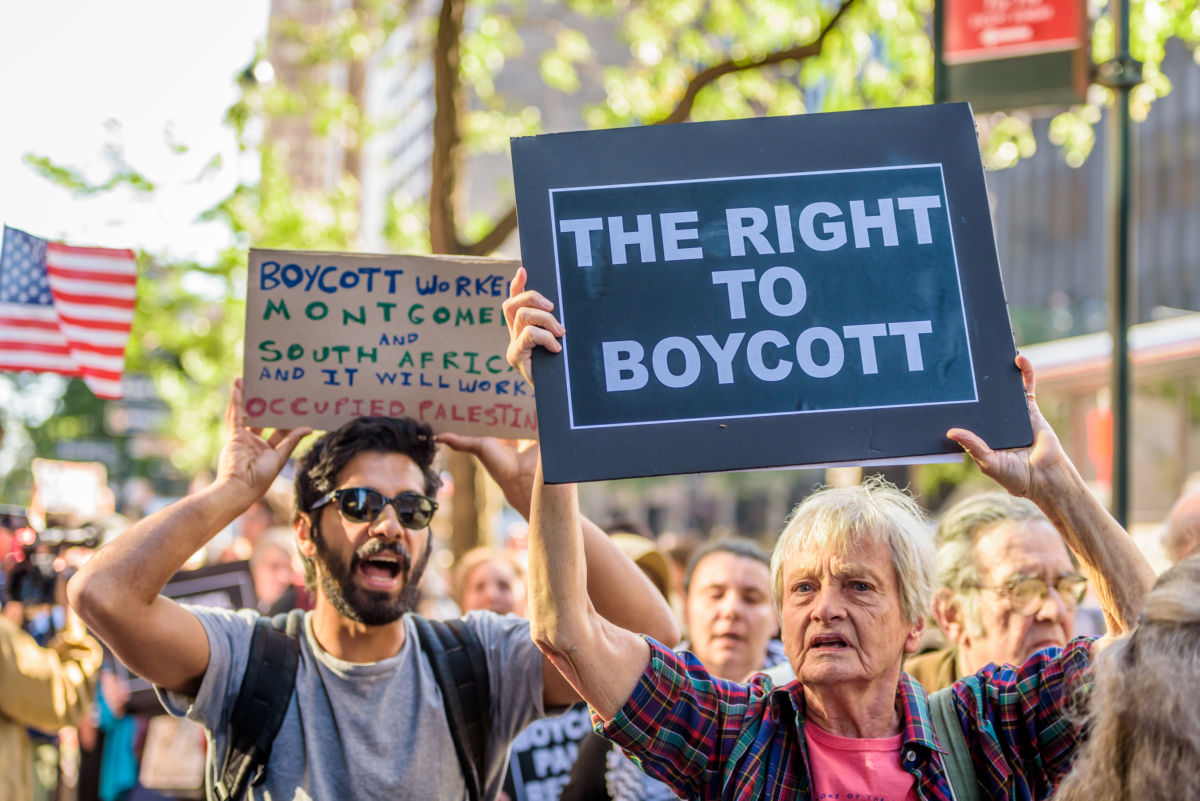Just days after Israeli forces demolished dozens of Palestinian homes in what international observers said amounted to a war crime, the U.S. House of Representatives late Tuesday passed a resolution condemning the non-violent boycott, divestment, and sanctions movement that is working to put an end to Israel’s brutal occupation.
The non-binding resolution, H.Res. 246, passed with the support of 209 House Democrats and 189 Republicans. Just 16 Democrats and one Republican — Rep. Thomas Massie (R-Ky.) — voted against the measure, which civil liberties groups and Palestinian rights advocates decried as an assault on free expression.
“Right now, Israel is breaking international law and demolishing Palestinian homes,” Rebecca Vilkomerson, executive director of Jewish Voice for Peace, said in a statement. “The Israeli government has shown, over and over, that it will continue to violate Palestinian human rights with impunity. This is precisely why the boycott, sanctions, and divestment movement should be protected, and not attacked.”
“BDS holds Israel accountable,” added Vilkomerson, “unlike the White House or Congress.”
As Israel commits war crimes against Palestinians and their soldiers laugh & pose with civilian homes they destroyed, Congress does this.
What they don't get is, this is precisely why civil society boycotts continue to grow; the abject failure of govt to hold Israel accountable https://t.co/bUyynXgp9Z
— (((YousefMunayyer))) (@YousefMunayyer) July 24, 2019
Omar Barghouti, a co-founder of the BDS movement, slammed the House resolution as a “McCarthyite, anti-Palestinian measure” that would undermine First Amendment rights.
“It reinforces other McCarthyite anti-BDS laws, and will have a chilling effect on free speech,” said Barghouti, “especially speech that is critical of Israel’s military occupation and apartheid.”
Progressives urged House Democratic leaders to abandon the non-binding measure ahead of Tuesday’s vote, but the leadership ultimately sided with the right wing of the caucus, which has reportedly been demanding the vote for months.
In a speech on the House floor ahead of the vote, Rep. Rashida Tlaib (D-Mich.) — the first Palestinian-American woman ever elected to Congress and an outspoken supporter of the BDS movement — called the House measure an “attack on our freedom of speech and the right to boycott the racist policies of the government and the state of Israel.”
“It sets a dangerous precedent because it attempts to delegitimize a certain people’s political speech and to send a message that our government can and will take action against speech it doesn’t like,” said Tlaib, who voted against the resolution.
“It sets a dangerous precedent because it seeks to delegitimize a certain people’s political speech — and send a message that our government can and will take action against speech it doesn’t like.” Major speech by @RashidaTlaib against @AIPAC’s #HRes246. pic.twitter.com/LkOP18zYBX
— IfNotNow🔥 (@IfNotNowOrg) July 23, 2019
Palestinian rights groups made it a point to applaud Tlaib and the few other lawmakers who broke from their party to vote against the anti-BDS measure.
The 16 Democrats who voted against the resolution were: Reps. Tlaib, Ilhan Omar (Minn.), Alexandria Ocasio-Cortez (N.Y.), Earl Blumenauer (Ore.), André Carson (Ind.), Debbie Dingell (Mich.), Jesús García (Ill.), Raúl Grijalva (Ariz.), Pramila Jayapal (Wash.), Barbara Lee (Calif.), Betty McCollum (Minn.), Gwen Moore (Wis.), Chellie Pingree (Maine), Mark Pocan (Wis.), Bobby Rush (Ill.), and Bonnie Watson Coleman (N.J.).
We salute the 22 conscientious Members of Congress who did NOT support a dishonest resolution condemning First Amendment-protected boycotts in support of Palestinian rights. #HRes246 pic.twitter.com/QESj3uF8zG
— Arab American Instit. (@AAIUSA) July 24, 2019
“We applaud the brave representatives who defend the non-violent boycott movement and human rights advocates,” Stefanie Fox, deputy director of Jewish Voice for Peace, said in a statement. “Our values of equality and justice shouldn’t end when it comes to Israel/Palestine. If our elected officials can’t stand up for those values everywhere, they should at least stop obstructing those of us who will.”
Join us in defending the truth before it’s too late
The future of independent journalism is uncertain, and the consequences of losing it are too grave to ignore. To ensure Truthout remains safe, strong, and free, we need to raise $47,000 in the next 8 days. Every dollar raised goes directly toward the costs of producing news you can trust.
Please give what you can — because by supporting us with a tax-deductible donation, you’re not just preserving a source of news, you’re helping to safeguard what’s left of our democracy.
